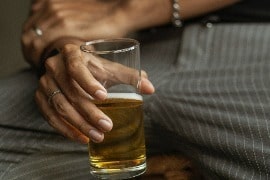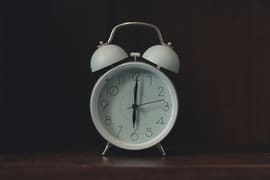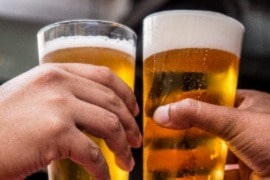Alcohol may cause hot flashes while you drink and after you’ve stopped drinking.
Article at a Glance:
Alcohol is a known risk factor for hot flashes. If you drink alcohol, you might notice that sometimes you feel warm or hot while drinking. It might not take much alcohol for your skin to feel very hot. Important points to remember about alcohol use and hot flashes include:
- When you are drinking alcohol, you may feel warm because drinking leads to more blood flowing through your blood vessels
- When you are hungover from alcohol use, you may experience hot flashes due to the hangover triggering a fight-or-flight response
- During alcohol withdrawal, you may have hot flashes because your brain is over-excited in withdrawal
- Some people of East Asian descent are at risk for flushing syndrome from alcohol because their bodies cannot break down alcohol (a condition called alcohol intolerance)
- The link between alcohol use and hot flashes in menopause is currently unclear and needs further research
Why Does Alcohol Make You Feel Hot?
You may feel like you have a high temperature after drinking alcohol because of how alcohol affects your brain. Your brain controls how your body responds to stimuli. Medical professionals think that alcohol tricks your brain cells into thinking that you are warm.
When you drink alcohol, your brain cells tell your blood vessels to expand to get rid of the extra heat. When the vessels expand, you might feel even warmer because of the increased blood flow inside the blood vessels beneath your skin. You may also find that you sweat more after you drink alcohol, because of increased blood flow in the vessels under your skin.
However, by expanding your blood vessels, alcohol helps cool your body. Your body will cool down even if you are in a warm room. You feel hot from drinking alcohol because you are losing heat through your skin. A link exists between alcohol and low body temperature, and it is known that people who are drunk are at risk of hypothermia.
Hangover Hot Flashes and Sweating
If you have a hangover the day after drinking alcohol, you may also experience hot flashes. During a hangover, your body temperature rises from the low body temperature you may have had when you were drunk.
However, you may start to feel very warm. Excessive sweating after drinking alcohol may also take place. Both hot flashes and sweating are signs that your hangover has triggered your sympathetic nervous system, commonly referred to as your fight-or-flight response.
Fight-or-flight response symptoms of a hangover can include:
- Trembling or shaking
- Sweating
- Feeling hot
- A rapid heartbeat
- High blood pressure
Additionally, sweating after a hangover can cause dehydration. Alcohol use already causes dehydration, which can lead to other hangover symptoms. Therefore, having a hangover symptom of sweating can further dehydrate your body, leading to additional hangover symptoms from dehydration.
During a hangover, dehydration symptoms may include:
- Being thirsty
- Feeling weak
- Having dry mouth or dry eyes
- Feeling dizzy or lightheaded
If your symptoms are related to an alcohol hangover, you will likely notice that they probably set in a few hours after you stop drinking. Your symptoms may continue for up to 24 hours after your last drink.
Make sure you drink enough fluids before, during and after drinking alcohol to avoid dehydration. Sports drinks and bouillon are good choices to help your body replace the water, salt and potassium you lost when you were drunk.
Hot Flashes From Alcohol Withdrawal
If you struggle with alcohol abuse or alcohol use disorder and experience alcohol withdrawal syndrome, or AWS, you may have many uncomfortable symptoms. Hot flashes and sweating are only two of many signs of AWS that you may experience.
Like hangover symptoms, hot flashes and sweating from AWS occur because alcohol withdrawal triggers your fight-or-flight response. Usually, alcohol has a calming impact on your brain, making your brain highly sensitive to glutamate, a chemical that excites your brain. Without alcohol in your system, your brain can become over-excited quickly.
Although some symptoms of AWS are merely uncomfortable, other symptoms can be highly dangerous. Never try to get through AWS without medical help as some withdrawal symptoms can be fatal. Enrolling in a medical detox program can help you avoid life-threatening withdrawal symptoms and detox from alcohol safely with the help of professionals.
Other Causes of Alcohol Hot Flashes
For some people, sudden alcohol intolerance and menopause can contribute to alcohol-related hot flashes.
Sudden Alcohol Intolerance
Some people, especially those of East Asian descent, may face a high risk of sudden alcohol intolerance, an uncomfortable flushing reaction that occurs shortly after drinking alcohol.
This chemical reaction in the body does not mean that you are drunk or drank too much. The response means that your body does not have the chemical enzymes to break down alcohol effectively. Therefore, toxic alcohol byproducts stay in your body, making you feel sick.
Symptoms of sudden alcohol intolerance include:
- Flushed skin
- Nausea
- Rapid heart rate
- Low blood pressure
- Headache
- Sleepiness or lethargy
- A stuffy nose
Menopause
Studies show different results about how alcohol use affects menopause symptoms. Besides being linked to alcohol use, hot flashes and sweating are common symptoms in women who are experiencing menopause.
Some research shows that alcohol use increases the risk of hot flashes, while other studies have found the opposite. Alcohol is known to increase the level of estrogen in the body, which may help to prevent hot flashes. However, as described above, alcohol itself is a known risk factor for hot flashes. Medical professionals are not sure why the results vary so widely in the studies, and more research is likely needed.
If you struggle with alcohol abuse and are trying to quit, you do not have to do it alone. The Recovery Village can help. Our caring representatives can answer your questions about alcohol rehab and help you pick a program that meets your needs. Contact us today to learn more.
Articles Related to Alcoholism

Alcohol detox isn’t easy and not everyone can do it on their own. That is why alcohol detox and alcohol withdrawal treatment is administered by medical professionals.

Alcoholism takes many forms, and the stereotype doesn’t always hold true. So when do a few drinks with friends become a full-blown alcohol addiction? How do you know if you are an alcoholic?

While cirrhosis scars from excessive drinking are irreversible, quitting alcohol and leading a healthier lifestyle can help your liver heal from alcohol-related liver disease.

When detoxing, hydration is key. However, certain food groups also have benefits when it comes to helping with the discomfort of withdrawal symptoms and detoxification.

Detox from alcohol can begin within hours. Typically, alcohol withdrawal symptoms happen for heavier drinkers. Alcohol withdrawal can begin within hours of ending a drinking session.

Daily drinking can have serious consequences for a person’s health, both in the short- and long-term. Many of the effects of drinking every day can be reversed through early intervention.


Yoda T, Crashaw L, et al. “Effects of alcohol on thermoregulation d[…]t exposure in humans.” U.S. National Library of Medicine, published in July 2005. Accessed April 22, 2019.
Swift Robert, Davidson Dena. “Alcohol Hangover: Mechanisms and Mediators.” Alcohol Health & Research World, published in 1998. Accessed April 22, 2019.
MedlinePlus. “Hangover Treatment.” Reviewed May 21, 2017. Accessed April 22, 2019.
Schilling Chrissy, Gallicchio Lisa, et al. “Current Alcohol Use, Hormone Levels, and[…]hes in Midlife Women.” U.S. National Library of Medicine, published in June 2007. Accessed April 22, 2019.
The Recovery Village aims to improve the quality of life for people struggling with substance use or mental health disorder with fact-based content about the nature of behavioral health conditions, treatment options and their related outcomes. We publish material that is researched, cited, edited and reviewed by licensed medical professionals. The information we provide is not intended to be a substitute for professional medical advice, diagnosis or treatment. It should not be used in place of the advice of your physician or other qualified healthcare providers.